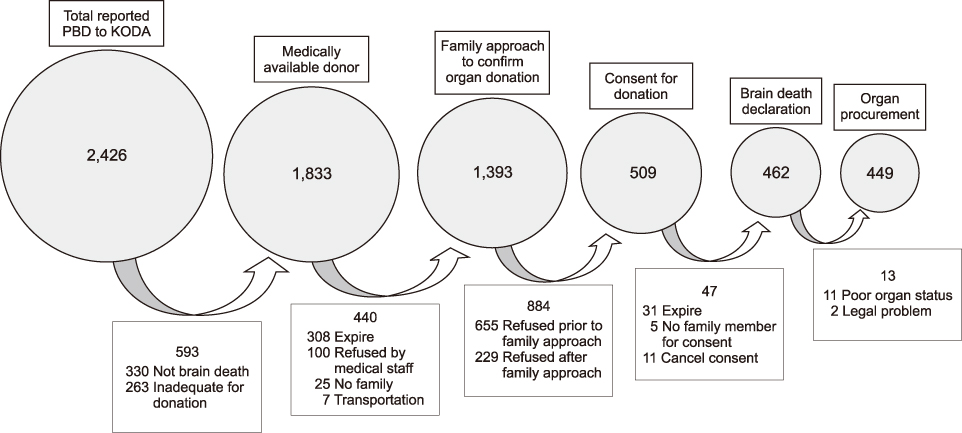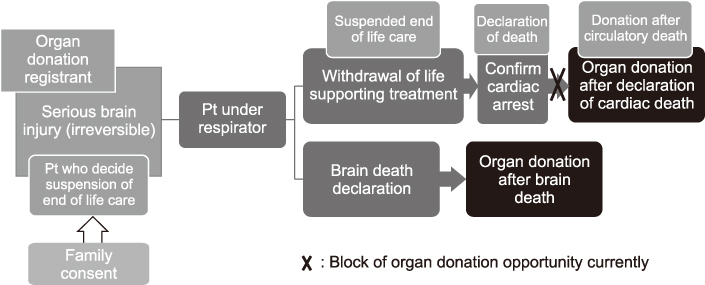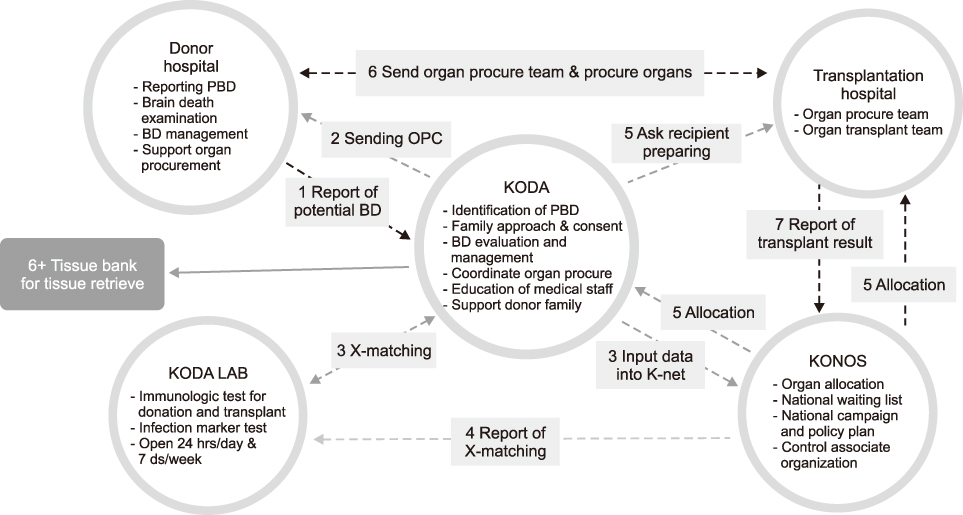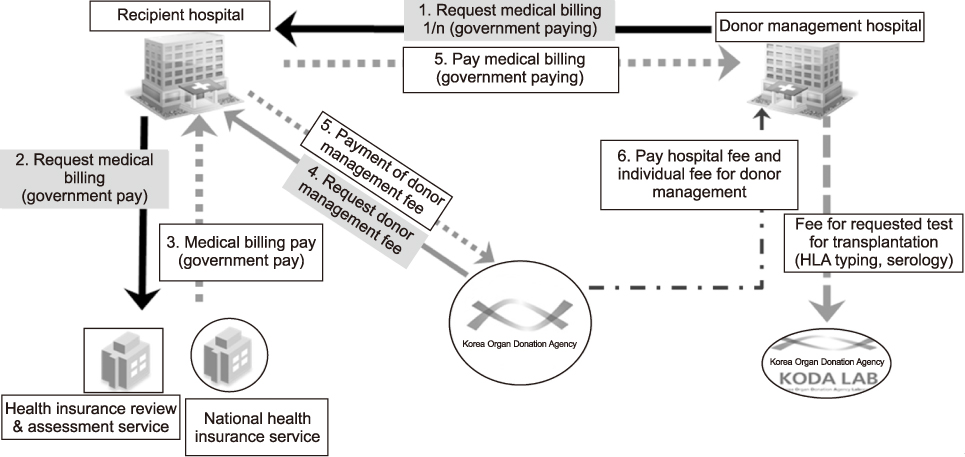Organ donation in Korea in 2018 and an introduction of the Korea national organ donation system
- Affiliations
-
- 1Korea Organ Donation Agency, Seoul, Korea. wh51cho@gmail.com
- KMID: 2468158
- DOI: http://doi.org/10.4285/jkstn.2019.33.4.83
Abstract
- A total of 1,503 solid organs were procured from 449 deceased donors in 2018. Although the number of donors was down by 12.8% from the previous year (8.7 per million population), the number of organs procured per donor increased from 3.29 in 2017 to 3.35 in 2018. While the causes of brain death by cerebrovascular diseases and head trauma from traffic accidents have declined, brain damage from hypoxia has increased slightly. The most prominent change in the decline of organ donations was a decrease in family consent (36.5% in 2018 vs. 42.9% in 2017). The disagreement over organ donations by other family members even extended beyond the next of kin, and the restriction of organ donations in connection with the suspension of end-of-life care partly affected the consent rate, making this a controversial social issue. An accurate analysis regarding the factors causing the decline of familial consent rates is required, and related organizations along with the government should make a unified concerted effort to resolve this issue. To help achieve this goal, this manuscript describes the transplantation process and briefly explains the Korean domestic organ donation system.
MeSH Terms
Figure
Cited by 4 articles
-
Reuse of liver allograft from a brain-dead recipient: A case report
Min-Jae Kim, Shin Hwang, Dong-Hwan Jung, Gil-Chun Park, Gi-Won Song, Hwui-Dong Cho, Sung-Gyu Lee
Ann Hepatobiliary Pancreat Surg. 2020;24(2):192-197. doi: 10.14701/ahbps.2020.24.2.192.Prognosis of Split Liver Transplantation Compared with Whole Liver Transplantation in Adult Patients: Single-center Results under the Korean MELD Score-based Allocation Policy
Gil-Chun Park, Shin Hwang, Gi-Won Song, Dong-Hwan Jung, Tae-Yong Ha, Chul-Soo Ahn, Deok-Bog Moon, Ki-Hun Kim, Young-In Yoon, Woo-Hyoung Kang, Hwui-Dong Cho, Jin Uk Choi, Minjae Kim, Byeong-Gon Na, Sang Hoon Kim, Sung-Gyu Lee
J Korean Med Sci. 2020;35(37):e304. doi: 10.3346/jkms.2020.35.e304.Clinical sequence of an adult recipient undergone split liver transplantation using a right liver graft with erroneous deprivation of the middle hepatic vein trunk: a case report
Geunhyeok Yang, Shin Hwang, Chul-Soo Ahn, Tae-Yong Ha, Dong-Hwan Jung
Korean J Transplant. 2021;35(3):189-194. doi: 10.4285/kjt.21.0010.Exploring the experiences and perspectives of emergency physicians on brain death organ tissue donation after the Life-Sustaining Treatment Decision Act
Song Yi Park, Hyun Kim, Kwi Hwa Park, Seung Min Park, Dong Eun Lee, Yong Hun Jung, Wonjoon Jeong, Kyung Hye Park
Korean J Transplant. 2022;36(1):29-36. doi: 10.4285/kjt.22.0005.
Reference
-
1. Hart A, Smith JM, Skeans MA, Gustafson SK, Wilk AR, Robinson A, et al. OPTN/SRTR 2016 annual data report: kidney. Am J Transplant. 2018; 18 Suppl 1:18–113.
Article2. Shafer TJ, Wagner D, Chessare J, Schall MW, McBride V, Zampiello FA, et al. US organ donation breakthrough collaborative increases organ donation. Crit Care Nurs Q. 2008; 31:190–210.
Article3. United Network for Organ Sharing. Data/transplant trends [Internet]. Richmond, VA: United Network for Organ Sharing;cited 2019 Dec 20. Available from: https://unos.org/data/transplant-trends.4. Domínguez-Gil B, Danovitch G, Martin DE, López-Fraga M, Van Assche K, Morris ML, et al. Management of patients who receive an organ transplant abroad and return home for follow-up care: recommendations from the Declaration of Istanbul Custodian Group. Transplantation. 2018; 102:e2–e9.5. International Summit on Transplant Tourism and Organ Trafficking. The declaration of Istanbul on organ trafficking and transplant tourism. Clin J Am Soc Nephrol. 2008; 3:1227–1231.6. International Registry in Organ Donation and Transplantation. Preliminary numbers 2018: IRODaT international registry in organ donation and transplantation [Internet]. Barcelona: International Registry in Organ Donation and Transplantation;cited 2019 Dec 20. Available from: www.irodat.org.7. Korea Organ Donation Agency. KODA annual report 2018. Seoul: Korea Organ Donation Agency;2019.8. Ministry of Health and Welfare. Related laws such as organs and human tissues in 2019. Sejong: Ministry of Health and Welfare;2019.9. Levin A. The impact of first-person consent legislation on the supply of deceased organ donors [thesis]. Allendale Charter Twp, MI: Grand Valley State University;2014.10. Traino HM, Siminoff LA. Attitudes and acceptance of First Person Authorization: a national comparison of donor and nondonor families. J Trauma Acute Care Surg. 2013; 74:294–300.11. Callison K, Levin A. Donor registries, first-person consent legislation, and the supply of deceased organ donors. J Health Econ. 2016; 49:70–75.
Article12. Statistics Korea. Changes in death rates by major causes of death from annual report on the causes of death statistics 2018. Daejeon: Statistics Korea;2018.13. Lee J, Lee JG, Jung I, Joo DJ, Kim SI, Kim MS, et al. Development of a Korean liver allocation system using model for end stage liver disease scores: a nationwide, multicenter study. Sci Rep. 2019; 9:7495.
Article14. Park UJ, Kim MY, Kim HT, Cho WH. Validation of the KDRI in Korean deceased donor kidney transplantation. J Korean Soc Transplant. 2014; 28:78–82.
Article15. Yang JS, Gu TY, Lee JY, Yoon YS, Chung YI, Byun HS. Suggestions for improvement of the expanded category of kidney transplantation donor in Korea. Wkly Health Dis. 2018; 11:1231–1237.16. Siminoff LA, Alolod GP, Wilson-Genderson M, Yuen EYN, Traino HM. A comparison of request process and outcomes in donation after cardiac death and donation after brain death: results from a national study. Am J Transplant. 2017; 17:1278–1285.
Article17. Bernat JL, D'Alessandro AM, Port FK, Bleck TP, Heard SO, Medina J, et al. Report of a national conference on donation after cardiac death. Am J Transplant. 2006; 6:281–291.
Article18. Center for Korean Network for Organ Sharing. Annual report of organ transplantation and tissue donation in 2018. Cheongju: Center for Korean Network for Organ Sharing;2019.19. Lee SH, Huh KH, Lee HS, Kim HJ, Kim MS, Joo DJ, et al. Waiting time for deceased donor kidney allocation in Korea: a single center experience. J Korean Soc Transplant. 2012; 26:32–37.
Article20. Ministry of Justice. Act on decisions on life-sustaining treatment for patients in hospice and palliative care or at the end of life (partially revised on Dec 2018. Act No. 15912). Gwacheon: Ministry of Justice;2018.21. Antoine C, Mourey F, Prada-Bordenave E. Steering committee on DCD program. How France launched its donation after cardiac death program. Ann Fr Anesth Reanim. 2014; 33:138–143.
Article22. Andrews PA, Burnapp L, Manas D. British Transplantation Society. Summary of the British Transplantation Society guidelines for transplantation from donors after deceased circulatory death. Transplantation. 2014; 97:265–270.
Article23. Manara AR, Murphy PG, O'Callaghan G. Donation after circulatory death. Br J Anaesth. 2012; 108 Suppl 1:i108–i121.
Article24. Summers DM, Johnson RJ, Allen J, Fuggle SV, Collett D, Watson CJ, et al. Analysis of factors that affect outcome after transplantation of kidneys donated after cardiac death in the UK: a cohort study. Lancet. 2010; 376:1303–1311.
Article25. Sade RM. Brain death, cardiac death, and the dead donor rule. J S C Med Assoc. 2011; 107:146–149.26. Lee WS. The influence of college students' social withdrawal on satisfaction with life: with emphasis on the mediating effect of aggression. Health Soc Welf Rev. 2018; 38:75–108.
Article
- Full Text Links
- Actions
-
Cited
- CITED
-
- Close
- Share
- Similar articles
-
- National Organ Transplantation Policy
- A 25-year scoping review of the organ donation system in Malaysia: past, present, and future
- Willingness and attitude of the Arab world population towards solid organ
- Factors Influencing Family's Organ Donation Decision
- Meaningful Correlation between the donor registration rate and the number of organ donors by region





